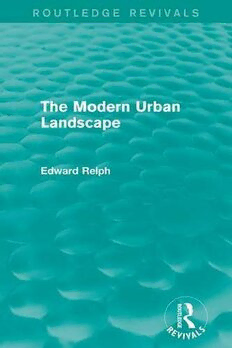
The Modern Urban Landscape PDF
Preview The Modern Urban Landscape
Routledge Revivals The Modern Urban Landscape First published in 1987, this book provides a wide-ranging account of how modern cities have come to look as they do - differing radically from their predecessors in scale, style, detail and meaning. It uses many illustrations and examples to explore the origins and development of specific landscape features. More generally it traces the interconnected changes which have occurred in architectural and aesthetic fashions, in economic and social conditions, and in planning - which together have created the landscape that now prevails in most of the cities of the world. This book will be of interest to students of architecture, urban studies and geography. Thisp agei ntentionallleyf tb lank This page intentionally left blank The Modern Urban Landscape Edward Relph Firstpublishedin1987 byCroomHelm Thiseditionfirstpublishedin2016byRoutledge 2ParkSquare,MiltonPark,Abingdon,Oxon,OX144RN andbyRoutledge 711ThirdAvenue,NewYork,NY10017 RoutledgeisanimprintoftheTaylor&FrancisGroup,aninformabusiness ©1987E.Relph All rights reserved. No part of this book may be reprinted or reproduced or utilised in any form or by any electronic, mechanical, or other means, now knownor hereafterinvented,includingphotocopyingandrecording,orin any informationstorageorretrievalsystem,withoutpermissioninwritingfromthe publishers. Publisher’sNote Thepublisherhasgonetogreatlengthstoensurethequalityofthisreprintbut pointsoutthatsomeimperfectionsintheoriginalcopiesmaybeapparent. Disclaimer The publisher has made every effort to trace copyright holders and welcomes correspondencefromthosetheyhavebeenunabletocontact. ALibraryofCongressrecordexistsunderLCcontrolnumber:87003809 ISBN13:978-1-138-66769-3(hbk) ISBN13:978-1-315-61886-9(ebk) ISBN13:978-1-138-66775-4(pbk) THE MODERN URBAN LANDSCAPE EDWARD RELPH CROOM HELM London & Sydney Contents Preface 1. In trod uction 1. 2. Looking Back at the Future: Late Twentieth-century Landscapes in the 1890s 11 Victorian inequalities 12 Socialism and new technologies 13 Edward Bellamy's Boston in 2000 19 William Morris's future English landscape 20 Utopian realities 22 3. Old Styles and New Forms in Architecture: 1880-1930 25 Victorian architecture 26 The decline of the last classical revival 29 Building big and building tall 33 Early skyscrapers in Chicago 35 Skyscraper styles to 1930 37 The origins of downtown 43 4. The Invention of Modern Town Planning: 1890-1940 49 Precedents for modern town planning 49 City beautiful and master planning 52 Garden cities 55 The landscape of garden cities 57 Neighbourhood units 62 The Radburn principle 65 Zoning 67 Unrealised ideal city plans: Radiant City and Broadacre 69 Comments on the invention of town planning 74 5. Ordinary Landscapes of the First Machine Age: 1900-40 76 Parkways and expressways 77 Mechanical streets and the municipal landscape 79 Early commercial strips and the decline of main street 83 Conspicuous mass consumption 89 Invidious scientific management 93 6. Modernism and Internationalism in Architecture: 1900-40 98 Sources of modernism 99 Functional futurism 102 An interlude - World War I 105 The Bauhaus 106 Modernist housing projects 109 Le Corbusier 112 Principles of modernism in the work of Mies van der Rohe 114 The international movement 117 7. Landscapes in an Age of Illusions: 1930 to the Present 119 Microscopic manipulation and anonymous expertise 120 Visible effects of new technologies 122 Adaptability, mimicry, opacity, ephemerality 126 Imagineering 129 The megamachine with its electronic eyes on the street 130 Nuclearism 133 8. Planning the Segregated City: 1945-75 138 Standardised planning procedures and planning by numbers 140 Clean-sweep planning and urban renewal 144 Pedestrian precincts, plazas and tunnels 150 State and corporate new towns 153 Highway design and the demise of the street 158 How to recognise a planned place 162 9. The Corporatisation of Cities: 1945- 166 Manifestations of corporatisation 167 Towers of conspicuous administration 168 Levittown and the corporate suburb 172 Corporate malls 178 Commercial strips - from casual chaos to television road 181 Corporatisation, planning and architecture 185 Commodification and the seductive corporate city 187 10. Modernist and Late-Modernist Architecture: 1945- 190 Mies van der Rohe and the skin and bones style 191 Le Corbusier and the concrete cage 195 No-frills modernism and new brutalism 198 Expressionism 201 Late-modernist architecture 202 11. Post-Modernism in Planning and Architecture: 1970- 211 The old is new again 213 Commercial and residential gentrification 215 Heritage planning and preservation 221 Post-modern architecture 224 Urban design 229 Community planning 231 Late twentieth-century eclecticism 236 12. Modernist Cityscapes and Post-Modernist Townscapes 238 Design phases in twentieth-century townscape 239 Qualities of modernist cityscapes 242 Qualities of post-modern townscapes 252 A modernist or post-modernist future landscape? 258 A unity of disunity - concluding comments 259 Bibliography 268 Index 274
